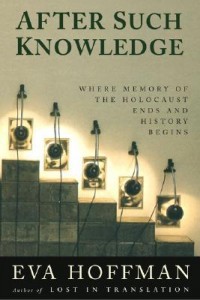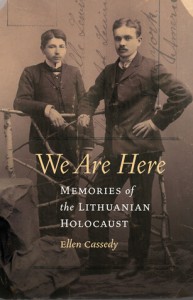Yom HaShoah Reflections on Eva Hoffman’s AFTER SUCH KNOWLEDGE (A Guest Post by Ellen Cassedy)
As we approach Yom HaShoah (Holocaust Remembrance Day), author Ellen Cassedy shares reflections on an influential book in this guest post.
Remembering the Holocaust with Eva Hoffman
by Ellen Cassedy
 “What meanings does the Holocaust hold for us today – and how are we going to pass on those meanings to subsequent generations?” These are the questions Eva Hoffman poses in her courageous book, After Such Knowledge: Memory, History, and the Legacy of the Holocaust.
“What meanings does the Holocaust hold for us today – and how are we going to pass on those meanings to subsequent generations?” These are the questions Eva Hoffman poses in her courageous book, After Such Knowledge: Memory, History, and the Legacy of the Holocaust.
Hoffman’s acclaimed memoir, Lost in Translation, recounts her emigration from Poland at age 13 with her parents, who were Holocaust survivors, and her struggles to adjust to her new home in Canada. Published 15 years later, in 2004, After Such Knowledge is less well-known, but it made a deep impression on me when I first read it. As we observe Yom HaShoah, Holocaust Remembrance Day, I’ve been rereading it and finding it as provocative and valuable as ever.
The book is a multi-faceted meditation. It draws on Hoffman’s personal experiences and those of other children of survivors; her extensive reading in the fields of psychology, culture, and politics; and her years of conversations with Poles and Germans of all ages.
I discovered the book at the exact moment that I myself was embarking on a journey to the Old World – to Lithuania, the land of my Jewish forebears. Setting off to study Yiddish, I wanted to savor the precious remnants of the Jewish world that flourished before the war, and to learn more about the annihilation of that world during World War II.
But Hoffman – by her example and with her words – prodded me to look further. She prompted me to open my eyes and take in the other cultures among whom the Jews once lived and, in greatly reduced numbers, still live today. “We need, most of all,” she urges in her book, “to be able to talk to each other with honesty and some boldness across our differences.”
In that spirit, I sought to extend the bounds of empathy. I talked not only with Jews but with non-Jews – about the legacy of the Holocaust and also about the legacy of the Soviet era in Lithuania. Cautiously, we explored our disparate histories and how they intersected.
Yes, I encountered evidence of anti-Semitism. I saw swastikas. I heard about neo-Nazis marches. I learned that government prosecutors have done a poor job of bringing former Nazi collaborators to justice – yet have pointed the finger at several elderly Jews who fought as courageous partisans against the Nazis. Often I felt overwhelmed by the complexities facing this land scarred by the Shoah.
But at the same time, I found myself inspired by the educators, activists, and ordinary citizens I met. Brave and good-hearted people, they were striving to extend hands across cultures – planning and attending memorial events, designing educational programs about the Holocaust, working toward mutual understanding.
The Holocaust will always be with us. “We must continue to ponder and confront the knowledge that the Shoah has brought us in perpetuity,” Eva Hoffman writes.
Yet at the same time, she writes that “it is necessary to separate the past from the present and to judge the present in its own light.”

On Yom HaShoah, I reflect on the questions raised by Hoffman’s profound and thoughtful work.
Can we honor the six million without perpetuating the fears and hatreds of the past?
Can we connect ourselves to one another as fellow beings with the capacity for moral choice?
Ellen Cassedy is the author of We Are Here: Memories of the Lithuanian Holocaust (University of Nebraska Press, March 2012).